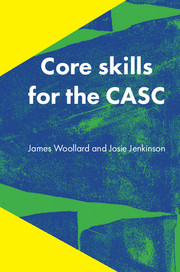Book contents
- Frontmatter
- Contents
- Abbreviations
- Preface
- Introduction
- Part 1 Core skills
- Part 2 Planning your preparation
- Part 3 Putting skills into practice – mock stations
- 10 Mock session 1: Finding your voice
- 11 Mock session 2: Talking techniques
- 12 Mock session 3: Taking control
- 13 Mock session 4: Structured stations
- Resources
- Appendix
- Index
10 - Mock session 1: Finding your voice
from Part 3 - Putting skills into practice – mock stations
Published online by Cambridge University Press: 01 January 2018
- Frontmatter
- Contents
- Abbreviations
- Preface
- Introduction
- Part 1 Core skills
- Part 2 Planning your preparation
- Part 3 Putting skills into practice – mock stations
- 10 Mock session 1: Finding your voice
- 11 Mock session 2: Talking techniques
- 12 Mock session 3: Taking control
- 13 Mock session 4: Structured stations
- Resources
- Appendix
- Index
Summary
Station 1
Instructions for candidate
Mrs Adams has been booked into your clinic for an initial assessment. She had asked for the first appointment and has turned up 30 min early. She was referred by her general practitioner (GP) who was worried she might be having a ‘nervous breakdown’.
• You should take a history of the presenting complaint.
• You are not required to do a risk assessment.
Instructions for actor
You are very anxious, unable to sit down. You have struggled to see the doctor because of your fear of going outside. You want to leave and get back home but you realise you need help.
You have had this fear of going outside your house for 3 years. You have found it increasingly difficult to lead a normal life and spend more and more time indoors. You have arranged your life so you do not have to go out. For example you speak to your sister in America via Skype; you order your shopping via the internet.
Three years ago your partner died in a car crash. Going anywhere near a moving car is particularly difficult for you and on several occasions you have run back home having gone out.
You have been admitted to hospital before, after collapsing on the high street. You had chest pain but the doctors could not find anything wrong with your heart.
You have not been having flashbacks as you were not involved in the crash that killed your partner. Your sleep is poor and you often find it difficult to go to sleep. Your appetite is fine. You still enjoy reading and watching television but find you cannot do this for too long as your concentration has got worse. Your concentration is often disturbed by thoughts of what might happen to you (e.g. get attacked in your house or burgled).
Prior to 3 years ago you would have said you were a very conscientious person who liked to make sure things were perfect.
The aim of this station is not necessarily for the candidate to get a detailed history but to demonstrate skills at dealing with a highly anxious person.
- Type
- Chapter
- Information
- Core Skills for the CASC , pp. 49 - 52Publisher: Royal College of PsychiatristsPrint publication year: 2016

